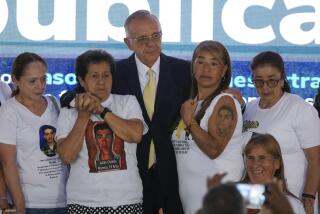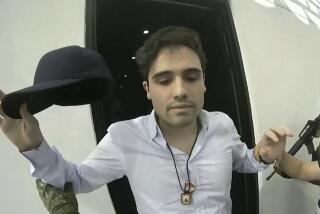Extradition OKd Despite Bogota Car Bomb Blast
BOGOTA, Colombia — Hours after a powerful car bomb exploded here Thursday, killing seven people and awakening fears that drug cartels may be renewing a dormant terrorist campaign to fight extradition, an undeterred President Andres Pastrana ordered a suspected narcotics trafficker sent to the United States to face criminal charges.
His signature was the last step in an 11-month process that will make Jaime Orlando Lara Nausa the first Colombian in nine years to be extradited to the United States for prosecution. The Supreme Court had approved the extradition Tuesday.
While no group has claimed responsibility for either Thursday’s bombing or an explosion Tuesday that severely injured a prosecutor who has tried drug traffickers, Colombians feared a renewal of the wave of bombings, kidnappings and assassinations that led this country to ban extradition in 1991.
The destruction caused when 150 pounds of explosives packed in a red sedan were detonated, apparently by remote control, shortly after 10 a.m. reminded Colombians of those horrifying months.
Under the slogan “Better a grave in Colombia than a cell in the United States,” powerful drug cartels led by the late Pablo Escobar assassinated presidential candidates, kidnapped prominent journalists and bombed buildings throughout the country, including the headquarters of the investigative police, until they forced the nation to declare the ban.
The inability to bring suspected drug traffickers to the United States for trial deprived U.S. authorities of what they consider one of their most powerful weapons in the war on drugs.
Drug traffickers face longer sentences--and more severe conditions--in the United States than they do in Colombia, where they often are able to bribe prison authorities and lead cushy lives behind bars. U.S. authorities have alleged that the traffickers even continue to run their drug operations from jail.
Colombia’s decision to pass a constitutional amendment in 1997 permitting extradition has been considered a key move in improving its relations with the United States. U.S. anti-narcotics aid to Colombia has more than doubled, to $289 million, since the ban was lifted, and the U.S. government is considering Colombia’s request for $1.5 billion in aid over the next three years.
Pastrana considers anti-drug cooperation and overall good relations with the United States so vital that he had previously threatened to immediately send to the United States all 41 Colombians being held pending extradition if any terrorist activities were aimed at stopping the process.
Those suspects include Fabio Ochoa, who served a prison term in Colombia for his role as a lieutenant in Escobar’s defunct Medellin cocaine cartel, and 29 others arrested last month as alleged members of the country’s largest drug cartel.
On Wednesday, the Supreme Court agreed to permit the United States to prosecute Fernando Flores Garmendia, who is believed to have information that the heads of the defunct Cali cartel, Miguel and Gilberto Rodriguez Orejuela, continued their drug operations from a Colombian prison after 1997. Such evidence would make the Rodriguez Orejuela brothers eligible for extradition too.
Lara Nausa, whose extradition Pastrana approved Thursday, allegedly represents the newest branch of Colombia’s illegal drug business. He is accused of importing heroin into the United States with the intent to distribute it. Colombia, which supplies about three-fourths of the world’s cocaine, is an increasingly important source of heroin for U.S. markets.
Although the cast of characters makes the stakes high for the pending extradition cases, Colombia’s drug barons are no longer organized into the powerful cartels that existed at the beginning of this decade. Thus, it is not clear whether their smaller, more flexible successors are able or inclined to carry out such a massive campaign of terror.
“If it is verified that this is narco-terrorism, not the government, not civil society, nobody will allow themselves to be intimidated,” Justice Minister Romulo Gonzalez told reporters. “We will follow through on the words of the president: We will extradite all drug traffickers.”
Gonzalez made those statements shortly after residents were shocked by news of the bombing in a stylish neighborhood that destroyed a house and a restaurant while reducing several cars to mangled metal frames. The 19 people injured in the blast were rushed to nearby hospitals as emergency workers covered mutilated bodies with sheets.
Bogota Mayor Enrique Penalosa condemned the attack as cowardly and offered a $50,000 reward for information leading to the capture of those responsible.
Special correspondent Morris reported from Bogota and Times staff writer Darling from San Salvador.
More to Read
Sign up for Essential California
The most important California stories and recommendations in your inbox every morning.
You may occasionally receive promotional content from the Los Angeles Times.










